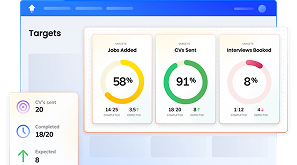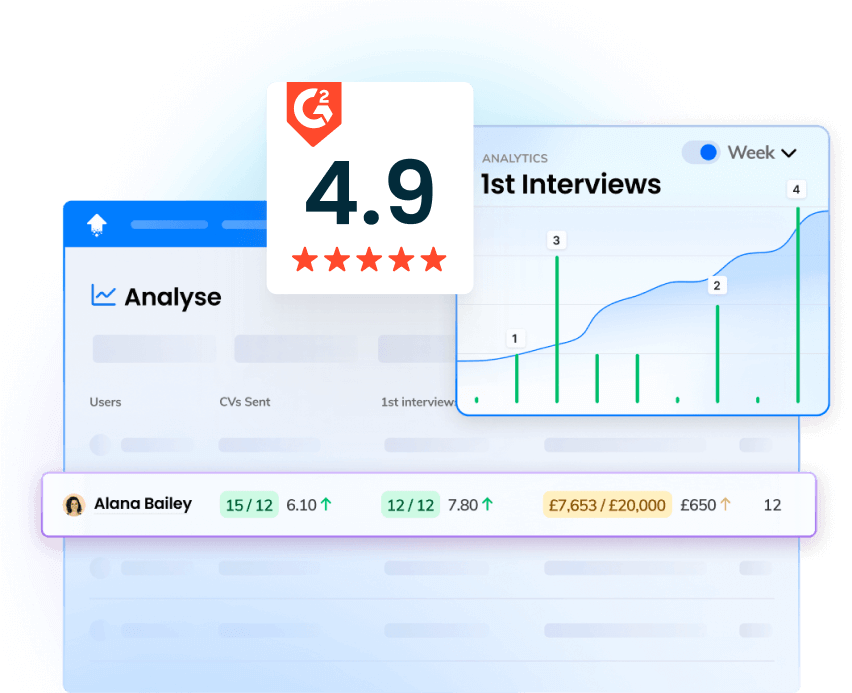There's a lot of money to be made in recruiting — but not every hiring role comes with a hefty pay packet.
Depending on their industry, region, and the type of organisation a recruiter works for, compensation can vary significantly.
This means the question of how much do recruiters make per hire gets a little complicated.
Common recruitment pay structures include:
- A base salary
- Performance-based commission
- A mixture of the two
There are pros and cons to each option.
For instance, base salaries provide financial security, but recruiters who earn commission are typically more motivated and have the chance to make significantly more money.
Meanwhile, commission rates vary by industry and role — so recruiters working in challenging markets or hiring into lower-valued positions can definitely benefit from a base salary.
Before entering the recruitment industry, it's essential to understand how compensation is structured in order to maximise your earning potential.
Types of Recruitment Remuneration Packages
Recruiter compensation packages vary, depending on whether you work as an internal recruiter or as part of an agency.
You may earn a base salary only or commission — or a mixture of the two.
Here are the most common types of recruitment remuneration packages, broken down.
Base Salary vs Commission
The base salary model in recruitment refers to a fixed, regular salary.
It is typically paid to internal recruiters or recruitment consultants, regardless of performance.
The pros of earning a base salary for in house recruiters include financial stability, with recruiters typically earning a set amount each month.
It also makes it easier for businesses to budget: they know exactly how much they're paying their staff.
However, recruiters on a base salary have limited earning potential — they don't get the vast bonuses possible on a commission-based model.
This lack of monetary incentive makes motivating recruitment teams harder.
Recruiters know they'll be paid regardless of performance, and there's little incentive to shoot for the stars.
In commission-based recruitment models, a recruiter's earnings are directly tied to their performance, typically based on the number of successful placements or hires they achieve.
Instead of a base salary, recruiters earn a percentage of the fee charged to the client for each hire.
This incentivises high performance, as more placements lead to higher earnings, rewarding those who consistently meet or exceed targets.
However, it can also be de-motivating, especially when market conditions are tough.
If talented recruiters are working hard and doing all the right things, but the state of the market means their earnings are suppressed, they may stop trying or consider leaving the business.
This potential lack of financial stability may also put top recruiters off applying for commission-only roles.
Combined Base and Commission Models
Many recruitment agencies typically offer external recruiters a compensation package that combines both base salary and commission.
This allows them to offer their recruiters financial security while also incentivising performance.
For example, a 50% salary, 50% commission remuneration package might look like this:
- Base Salary: £30,000 per year, paid monthly as £2,500.
- Commission: A potential additional £30,000 annually, based on performance.
Say the recruiter earns a 10% commission on each placement.
If they generate £300,000 in placement fees over the year, they would receive £30,000 in commission.
Combined, the recruiter could earn £60,000 total if they hit their targets (and a lot more if they greatly exceed their targets).
But if they don't, they know they have at least £30,000 with which to pay their bills.
How Compensation Differs by Recruitment Type
Different types of recruitment—such as permanent, contract, and headhunting—typically have different compensation packages.
Permanent Placement Recruitment
Commission within permanent placement recruitment typically works on a standard fee structure.
Their commission is usually worked out as a percentage of the candidate's first-year salary.
For example, if a recruiter places a candidate with a £50,000 salary at a 20% placement fee, the recruiter's agency earns £10,000.
The recruiter will then receive a portion of that percentage—perhaps half of that 20%—as commission.
Contract Recruitment
In contract placements, recruiters typically earn commission based on the contractor's hourly, daily, or project rates.
Instead of a one-off fee, the recruiter earns a percentage of the contractor's ongoing earnings, providing a steady stream of income.
For example, if a contractor is billed at £500 per day, the recruiter might earn 10%, or £50, for each day the contractor works.
This arrangement is lucrative because as long as the contractor remains in the role, the recruiter continues to earn commission, creating a recurring revenue stream that can be sustained for the contract's duration.
Executive Search/Headhunting
Headhunting is the most lucrative area of recruitment to work in due to the complexity and value of placements.
When working in executive search, you often place senior professionals in C-suite roles.
And executive positions come with a high price tag — and, therefore, excellent commission.
Of course, this higher earning potential comes with a trade-off.
When companies are searching for professionals to fill senior roles, they want to make sure they're making the right hire.
What's more, there are fewer professionals out there who are qualified for these types of roles.
This means time-to-hire can be significantly increased.
Recruitment agencies can also face long sales cycles when bringing large companies on board.
Regional Differences in Recruiter Pay
Your location and industry also significantly impact recruiter pay.
So, how much do recruiters make per hire in the UK, and how does this compare to other markets?
UK vs US vs Other Markets
Recruiter pay varies significantly across markets.
In the UK, recruiters often receive a mix of base salary and commission.
In the US, commission-heavy models are more common, with higher earning potential tied to performance.
Other markets like Australia and Europe typically offer balanced packages, but cultural and economic factors influence pay structures.
In the US, commission percentages tend to be higher, sometimes reaching up to 20-30%, due to the commission-heavy pay structure and a more competitive market.
Salaries are also generally higher in major hubs like New York or California.
In the UK, commission percentages are typically lower, around 10-20%, with a stronger emphasis on base salary. However, London-based recruiters can expect to earn more than those elsewhere due to the cost of living and demand.
Industry-Specific Pay Variations
Recruiter earnings can vary significantly by industry, with specialised sectors often offering higher commissions due to the complexity and demand for niche skills.
For example, in tech, recruiters may place highly skilled software engineers or data scientists.
These roles typically come with higher fees due to the scarcity of qualified candidates.
Similarly, healthcare and finance recruiters often work on high-stakes roles, such as doctors or financial analysts, which also command higher commissions.
In contrast, general industries like retail or administration — where roles are more abundant and easier to fill — tend to offer lower commissions.
Factors That Influence How Much Recruiters Make Per Hire
A recruiter's experience level, the size and structure of recruitment agencies, market demand, and hiring trends can all significantly impact compensation packages.
Recruiter Experience
Like in many industries, the longer you spend in recruitment, the more money you can demand.
More experienced recruiters come with a solid network of happy clients and qualified candidates, as well as a proven track record.
Bringing experienced recruiters on board is key to recruitment agency success — and they are willing to pay more to do so.
Junior recruiters can expect to start out with lower base salaries and smaller commissions than more senior recruiters.
Agency Size and Structure
The size and structure of a recruitment agency can also impact the recruiter's earning potential.
So, how much do agency recruiters make?
Larger agencies usually offer lower commission rates but provide more support to individual recruiters.
These agencies generally provide more resources to help recruiters fill open positions and have in-built candidate networks they can tap into.
This is a great option for inexperienced recruiters who are still learning the industry and working on building their network.
Boutique agencies, on the other hand, often offer higher commission splits, increasing earning potential.
But to capitalise on this, recruiters must be confident self-sourcers and come with a thriving candidate network, because these agencies typically expect recruiters to bring in top talent off their own backs.
Market Demand and Hiring Trends in 2024
Industries with high demand for talent drive more placements and higher fees.
This means that recruiters working in industries with falling demand can expect their earnings to take a hit.
Conversely, those working in high-demand, highly-skilled sectors like tech, healthcare, and green energy should see their wages grow significantly.
Recruiters can capitalise on market trends by specialising in these high-demand fields, building a network of skilled professionals, and focusing on niche roles where talent shortages exist.
As these industries evolve rapidly, recruiters who stay ahead of trends and offer expertise in specialised, in-demand roles will likely see higher earnings through increased placements and commissions.
Read more about the state of recruitment in 2024
Maximising Your Earnings as a Recruiter in 2024
Recruiters have the potential to earn a lot of money if they stay ahead of market trends, tap into emerging technology, and plan ahead.
Here are three ways to maximise your earnings in 2024's competitive recruitment landscape.
#1 Specialising in High-Value Niches
In order to earn big bucks as a recruiter, it's important to focus on high-value niches.
There are a number of ways to approach this.
You could specialise in certain high-value sectors that offer more commission, such as healthcare or tech.
Alternatively, you could work in headhunting and executive search, where you place senior staff with large pay packets.
The highest-earning recruiters manage to do both, for example, specialising in headhunting in the tech sector.
#2 Leveraging Technology to Boost Placements
However, maximising your earning potential is about more than just increasing the amount of money you make on each commission.
Earning £10,000 commission for one placement is brilliant — but not if that's the only placement you make all year.
It would be much better to earn an average of £2,000 commission per placement and fill 12 roles.
This is why it's important to strive to increase the number of placements you make, as well as how much you earn per role filled.
Advanced recruitment technology is designed to improve the efficiency and effectiveness of your recruitment process, boosting the number of successful placements you make.
For example, OneUp's recruiting analytics software empowers you to accurately track real-time performance, improve candidate sourcing, and increase your earning potential.

With OneUp's custom dashboards and automated reports, it's easy to dig into the data to find out which activities are boosting your performance and which are holding you back.
What's more, intuitive visualisations make it easy to see which sourcing platforms are working effectively and which are essentially redundant.
And with automation built-in, you no longer need to perform all those tedious, repetitive tasks that were slowing you down.

This empowers you to identify and resolve bottlenecks in your system, proactively address challenges, stay ahead of market trends — and ultimately, make more placements.
#3 Building Long-Term Relationships with Clients
You can't underestimate the power of a good reputation.
Building strong relationships with your clients fosters trust and loyalty, leading to repeat business, referrals, and higher recruitment commission plan payouts.
This steady flow of opportunities boosts placement volume, resulting in more commissions and a more consistent income for the recruiter.
Of course, building these relationships takes work.
You must deliver a high-quality service tailored to clients' needs and consistently provide top candidates.
Regular communication, transparency, and reliability are key, as well as demonstrating industry expertise and offering valuable insights
Conclusion
Recruiter earnings can vary wildly depending on whether you're an internal recruiter or an agency recruiter, as well as the industry and job type you hire into.
But there's plenty of money to be made for recruiters who specialise in high-value industries and roles to increase their commission and leverage technology to boost the number of placements they make.

Recruitment analytics platforms like OneUp make it easy to see which activities are speeding up your placements and which are slowing them down.
Armed with this knowledge, you can make informed decisions to speed up the recruitment journey and boost placements.
And more placements mean more money!
Explore OneUp's recruitment analytics software to optimise your performance and boost earnings. Book your demo today.



















